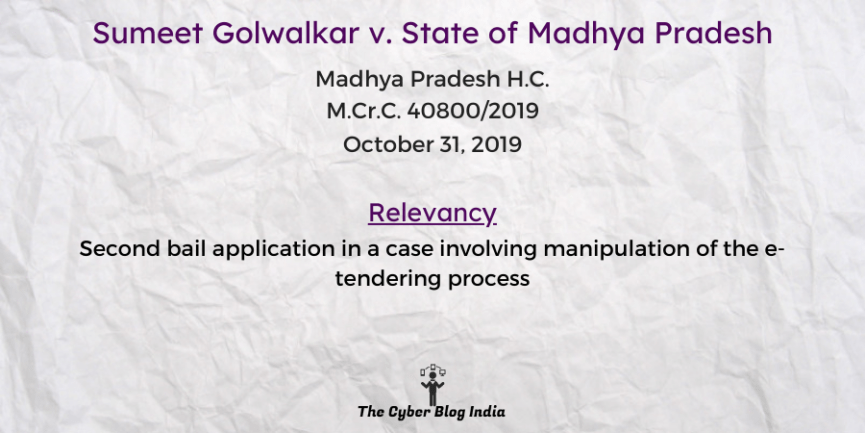Sumeet Golwalkar v. State of Madhya Pradesh

Sumeet Golwalkar v. State of Madhya Pradesh
In the High Court of Madhya Pradesh
M.Cr.C. 40800/2019
Before Justice Rajeev Kumar Dubey
Decided on October 31, 2019
Relevancy of the case: Second bail application in a case involving manipulation of the e-tendering process
Statutes and Provisions Involved
- The Information Technology Act, 2000 (Section 66)
- The Indian Penal Code, 1860 (Section 120B, 420, 467, 468, 471)
- The Prevention of Corruption Act (Section 7, 13(2))
Relevant Facts of the Case
- This is the applicant’s second bail application under Section 439 of the Code of Criminal Procedure, 1973. The Economic Offences Wing (EOW), Bhopal, arrested him on April 11, 2019. The High Court had rejected his first bail application on June 25, 2019.
- The allegations state that the accused persons had rigged the online bidding processes in favour of a few private players, making them the lowest bidders. Five private companies benefitted from nine tenders due to tampering with the e-procurement portal.
- The applicant registered the digital signature certificates (DSCs) of Praveen Guru and Keshav Rao Uike. Tender bids were manipulated using these DSCs.
- The ownership of corporate entities involved in this manipulation shows the direct involvement of the applicant.
Prominent Arguments by the Advocates
- The applicant’s counsel submitted that he is innocent. He is merely an employee of the company. The E-Mudra company had prepared the two DSCs and not the applicant. Considering that EOW has filed the chargesheet, the trial would likely take a long time. There is no likelihood of him absconding or tampering with evidence. The applicant deserves bail on the grounds of parity.
- The respondent’s counsel submitted that the applicant is the company’s marketing director. The evidence on record shows that the applicant had issued the digital signatures. The transfer of money to the company where the applicant is a partner shows his direct connection with the crime.
Opinion of the Bench
- The applicant’s case is not similar to that of the other co-accused persons who have been released on bail previously. The nexus of the applicant in the crime is clear. Such serious scams send a wrong message to the society, as well as affect the credibility of the government authorities.
- It also gives the impression that everything is possible through manipulation. Such acts should be dealt with severely.
- In light of the seriousness of the offence, the court did not show any inclination to grant bail.
Final Decision
- The court rejected the application.
Shrawani Mohani, an undergraduate student at ILS Law College, Pune, prepared this case summary during her internship with The Cyber Blog India in January/February 2021.
